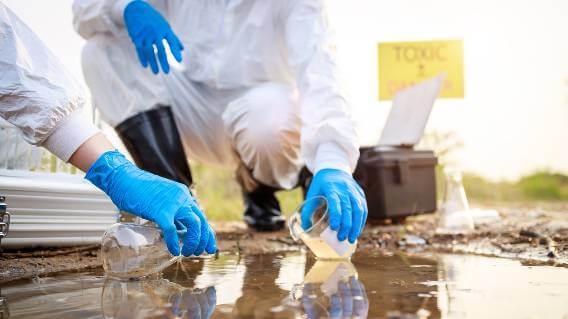Sen. Marco Rubio Questions Delay of Camp Lejeune Contamination Claims
Editors carefully fact-check all Drugwatch.com content for accuracy and quality.
Drugwatch.com has a stringent fact-checking process. It starts with our strict sourcing guidelines.
We only gather information from credible sources. This includes peer-reviewed medical journals, reputable media outlets, government reports, court records and interviews with qualified experts.

At least 60,000 claims have been filed by veterans, their families and others in connection to contaminated water at Marine Corps Base Camp Lejeune. But according to U.S. Sen. Marco Rubio, those claims have yet to be reviewed by the U.S. Navy.
Approximately 1 million people were exposed to tainted water at the North Carolina military base between 1953 and 1987. Those impacted by the hazardous chemicals in the water are able to take legal action through the Camp Lejeune Justice Act of 2022. The process, however, has been slow.
In a May 23 letter to Secretary of the Navy Carlos Del Toro, Rubio said those impacted by the water contamination are “stuck in a bureaucratic waiting game.” He asked why there has been such a delay in response to the thousands of Camp Lejeune claims filed and wants to see a timeline and plans to expedite the process.
Rubio is also asking how this delay will affect eventual payouts for claimants. Congressional projections say the total payout could reach $21 billion.
“These delays in claims processing is adding even more insult to injury for veterans, their dependents, and others who are suffering due to the Navy’s lack of movement to expeditiously process claims. Those who have served this nation deserve better,” Rubio stated in the letter.
Navy Faces Unprecedented Number of Claims
Navy attorney Jennifer Tennile Karnes addressed the issue in an email to claimants’ lawyers, according to Bloomberg Law. She said the delay comes from a lack of staff and lack of funding. Karnes said her tort claims unit is working “an unsustainable amount of overtime” to process all of the claims. She said she hopes to increase staff by nearly double by the end of the summer.
So far nearly 500 law firms have registered to represent Camp Lejeune clients, with another 100 pending. Lawyers claim some of their clients are dying while they continue to wait for compensation. Thousands more lawsuits are expected to be filed, which could turn this into one of the largest mass torts in history.
An online portal that should help speed up the claims process still has yet to be created by the U.S. Navy, Karnes said, blaming the backlog in part on a lack of funding from Congress.
Camp Lejeune Justice Act
The Camp Lejeune Justice Act, which was signed into law in August 2022, overrides a long-standing state law in North Carolina that prevents claims from being filed after 10 years. Under its provisions, veterans, their families and other citizens affected by the contaminated water at Camp Lejeune are now able to file lawsuits against the federal government.
This law covers anyone who lived, worked or may have been exposed to the hazardous water at Camp Lejeune for at least 30 days between Aug. 1, 1953, and Dec. 31, 1987.
Camp Lejeune’s water was contaminated with several toxic chemicals, including benzene, perchloroethylene, trichloroethylene and vinyl chloride. According to the Centers for Disease Control and Prevention, those contaminants may be responsible for causing several health issues, including many forms of cancer, birth defects, non-Hodgkin lymphoma, skin disorders, anxiety and dementia.
A study published by the Journal of the American Medical Association in May found that veterans stationed at Camp Lejeune have a 70% higher chance of being diagnosed with Parkinson’s disease compared to veterans at other bases.
The contamination at Camp Lejeune was caused by a combination of chemical spills and leaks that weren’t discovered until the 1980s. Some water tests found contamination that was 300 times the acceptable level.


